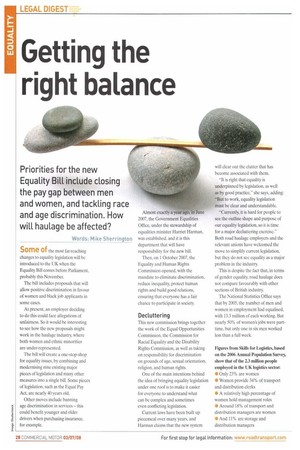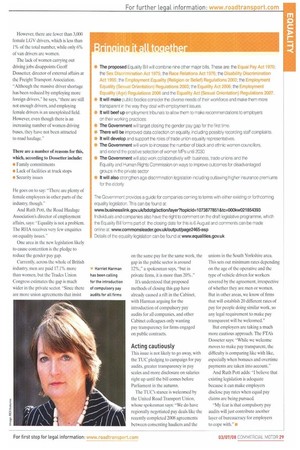Getting the right balance
Page 28

Page 29

If you've noticed an error in this article please click here to report it so we can fix it.
Priorities for the new Equality Bill include closing the pay gap between men and women, and tackling race and age discrimination. How will, haulage be affected?
Words: Mike Sherrington Some of the most far-reaching changes to equality legislation will be introduced to the UK when the Equality Bill comes before Parliament, probably this November.
The bill includes proposals that will allow positive discrimination in favour of women and black job applicants in some cases.
At present, an employer deciding to do this could face allegations of unfairness. So it would be interesting to see how the new proposals might work in the haulage industry, where both women and ethnic minorities are under-represented.
The bill will create a one-stop-shop for equality issues, by combining and modernising nine existing major pieces of legislation and many other measures into a single bill. Some pieces of legislation, such as the Equal Pay Act, are nearly 40 years old.
Other moves include banning age discrimination in services — this could benefit younger and older drivers when purchasing insurance, for example. Almost exactly a year ago, in June 2007, the Government Equalities Office, under the stewardship of equalities minister Harriet Harman, was established, and it is this department that will have responsibility for the new bill.
Then, on 1 October 2007, the Equality and Human Rights Commission opened, with the mandate to eliminate discrimination, reduce inequality, protect human rights and build good relations, ensuring that everyone has a fair chance to participate in society
Decluttering
This new commission brings together the work of the Equal Opportunities Commission, the Commission for Racial Equality and the Disability Rights Commission, as well as taking on responsibility for discrimination on grounds of age, sexual orientation, religion, and human rights_ One of the main intentions behind the idea of bringing equality legislation under one roof is to make it easier for everyone to understand what can be complex and sometimes even conflicting legislation.
Current laws have been built up piecemeal over many years, and Harman claims that the new system will clear out the clutter that has become associated with them.
"It is right that equality is underpinned by legislation, as well as by good practice," she says, adding: "But to work, equality legislation must be clear and understandable.
"Currently, it is hard for people to see the outline shape and purpose of our equality legislation, so it is time for a major decluttering exercise." Both road haulage employers and the relevant unions have welcomed the move to simplify current legislation, but they do not see equality as a major problem in the industry.
This is despite the fact that, in terms of gender equality, road haulage does not compare favourably with other sections of British industry.
The National Statistics Office says that by 2005, the number of men and women in employment had equalised, with 13.3 million of each working. But nearly 50% of women's jobs were parttime, but only one in six men worked less than a full week.
Figures from Skills for Logistics, based on the 2006 Annual Population Survey, show that of the 2.3 million people employed in the UK logistics sector: • Only 23% are women • Women provide 34% of transport and distribution clerks • A relatively high percentage of women hold management roles • Around 18% of transport and distribution managers are women • And 11% are storage and distribution managers However, there are fewer than 3,000 female LGV drivers, which is less than 1% of the total number, while only 6% of van drivers are women.
The lack of women carrying out driving jobs disappoints Geoff Dossetter, director of external affairs at the Freight Transport Association. "Although the massive driver shortage has been reduced by employing more foreign drivers," he says, "there are still not enough drivers, and employing female drivers is an unexploited field. However, even though there is an increasing number of women driving buses, they have not been attracted to road haulage."
There are a number of reasons for this, which, according to Dossetter include: • Family commitments • Lack of facilities at truck stops • Security issues He goes on to say: "There are plenty of female employees in other parts of the industry, though."
And Ruth Pott, the Road Haulage Association's director of employment affairs, says: "Equality is not a problem. The RHA receives very few enquiries on equality issues."
One area in the new legislation likely to cause contention is the pledge to reduce the gender pay gap.
Currently, across the whole of British industry, men are paid 17.1% more than women, but the Trades Union Congress estimates the gap is much wider in the private sector. "Since there are more union agreements that insist on the same pay for the same work, the gap in the public sector is around 12%," a spokesman says, "but in private firms, it is more than 20%."
It's understood that proposed methods of closing this gap have already caused a rift in the Cabinet, with Harman arguing for the introduction of compulsory pay audits for all companies, and other Cabinet colleagues only wanting pay transparency for firms engaged on public contracts.
Acting cautiously
This issue is not likely to go away, with the TUC pledging to campaign for pay audits, greater transparency in pay scales and more disclosure on salaries right up until the bill comes before Parliament in the autumn.
The TUC's stance is welcomed by the United Road Transport Union, whose spokesman says: "We do have regionally negotiated pay deals like the recently completed 2008 agreements between consenting hauliers and the unions in the South Yorkshire area. This sets out minimum rates depending on the age of the operative and the type of vehicle driven for workers covered by the agreement, irrespective of whether they are men or women. But in other areas, we know of firms that will establish 20 different rates of pay for people doing similar work, so any legal requirement to make pay transparent will be welcomed."
But employers are taking a much more cautious approach. The FTA's Dosseter says: "While we welcome moves to make pay transparent, the difficulty is comparing like with like, especially when bonuses and overtime payments are taken into account."
And Ruth Putt adds: "I believe that existing legislation is adequate because it can make employers disclose pay rates when equal pay claims are being pursued.
"My fear is that compulsory pay audits will just contribute another layer of bureaucracy for employers to cope with." N
































































































































































